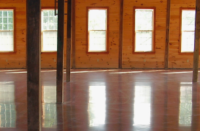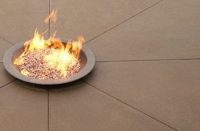 There are new profit opportunities in polished concrete for the decorative concrete contractor. This is a fact, and every decorative concrete contractor should look into polished concrete. However, nothing ever caused more people to go broke than too much optimism and not enough planning for success.
There are new profit opportunities in polished concrete for the decorative concrete contractor. This is a fact, and every decorative concrete contractor should look into polished concrete. However, nothing ever caused more people to go broke than too much optimism and not enough planning for success.
Most contractors, when entering the industry, research the different types of machines. They strongly consider which kind of machine to buy. What they fail to do, however, is properly educate themselves on tooling and ask themselves just what kind of surface prep or polished concrete business they want and don’t want. They fail to define their own company. There are support systems out there, but, like everything in life, you will have to be your own answer. Nobody else is going to come through for you and make it work out. So, when you make a big capital investment, you need a solid and realistic game plan.
I can’t tell you how many times I’ve had contractors come to me excited about the possibility of landing some work for a big box store and wanting to invest in equipment to do the work. As much as I hate to burst anyone’s bubble, that is not work for a novice.
The big retailers put more contractors out of business than they put in business. Everyone in concrete knows that concrete is unpredictable. Bidding wars, unexpected concrete issues, labor problems, travel expenses and timelines can shut an undercapitalized business down fast. Even larger, experienced contractors can quickly find themselves in a cash crunch. And because you need a certain amount of equipment to meet the deadlines and requirements of the big box stores, a contractor can easily be left with more equipment and capital investment than he will be able to utilize once that work is done.
These retailers are also unpredictable. They will tell you they plan to polish a hundred stores, and may in fact end up only polishing 20.
Another plan I’ve seen go awry is a decision to go into polishing residential homes and garages. Here, you will find the most finicky customers and the worst slabs. A contractor could spend a week grinding a garage floor. This might not be the most profitable way for you to spend your time — then again, it may be. How is your attention for detail? How good are you at pricing small jobs that will require a lot of time and labor? And, how good are you at edge work?
I have seen many contractors buy equipment and wait for the vendors to feed them work and write their destiny for them. This is the biggest mistake of all. The heavy lifting is done by the contractor in this industry. Make sure you already have some contacts that can help you break into polished concrete. Success comes through hard work, networking, relationship-building, having the proper capital, and turning out a quality floor.
Most important in the beginning is finding your first work, work that needs to be manageable and profitable. This is why it is important to consider the contacts you already have when considering what kind of work you will start out doing. Take the easiest path — the path you already somewhat know. You can always expand later, once you have more experience. Are you a coatings applicator? Maybe it would be best to start out doing surface prep. If you break into polishing, don’t start out with a job you had to bid. Start with negotiated work. Take on a project you feel confident you can complete, even if you run into some unexpected issues.
Don’t bid square footage. Bid the job. As you gain more experience, you’ll get better at this. Determine the time and resources that you will have to commit, and how much you need to take home, and bid the work that way. Moderate growth is often wiser than fast growth. If you grow too fast, your stress level increases, your cash flow can dry up, the pressure increases, the work can suffer, and your reputation can suffer. You can easily end up in over your head. As I said, nothing ever caused more heartache and disappointment than too much optimism.
Polished concrete offers a lot of opportunity, but it is not an easy, simple floor to produce. It requires a lot of knowledge, a lot of management and a lot of efficiency. It requires a lot of consideration.
There are also personal issues that need to be considered by your whole family, your labor force, and their families. How much do you want to travel? How much time do you want to spend away from home? And, how many weekends and evenings and holidays is your family willing to sacrifice? It is better to address these things up front, so you don’t end up with a capital investment you aren’t efficiently utilizing. And you don’t need your trained labor walking off important jobs because they have personally had enough.
Continual education is also very important. This is a new and fast-changing industry. Always keep yourself up to date on new players in the industry, new products, and the points of view of as many people as you can access. This is an industry where the people who know the most will do the best. Talk to everybody. Read everything. Do your own homework. If you are investing in the stock market, it is not wise to just trust your broker or to just take the word of the company that issues the stock. You have to do your own research, or you won’t make a lot of money. This is no different.















